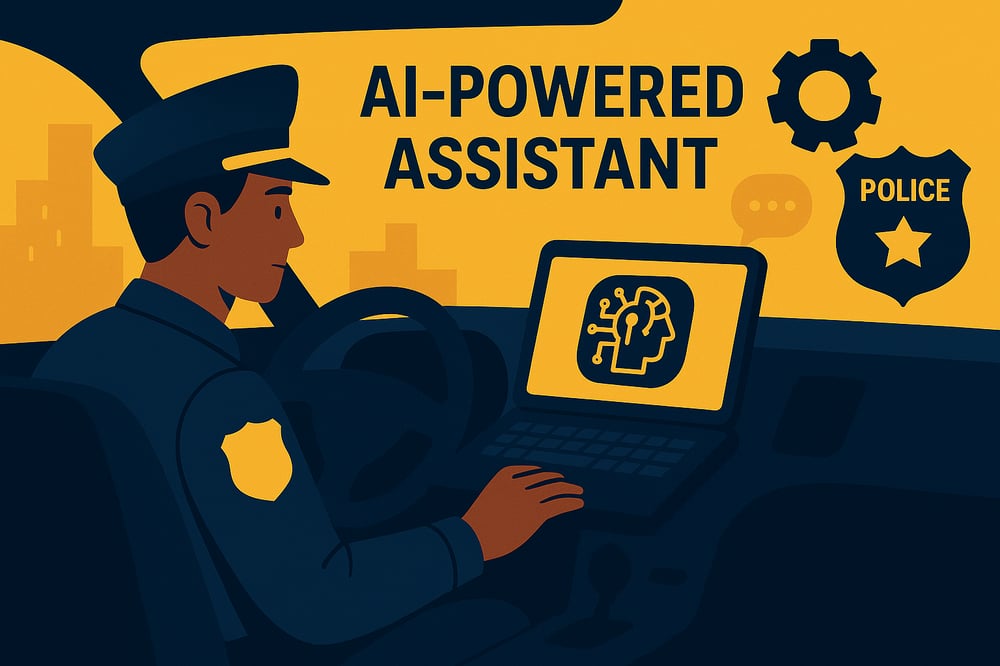Why Every Officer in America Will Have an AI Assistant in the Patrol Car Within Three Years
Technology Artificial Intelligence Apr 24, 2025 9:00:00 AM Anthony Tassone 3 min read

In the next three years, artificial intelligence (AI) assistants will become as standard in patrol cars as radios and laptops. This shift isn’t about replacing human judgment—it’s about enhancing it. With departments across the country facing rising call volumes amid staffing and retention issues, increased documentation demands, and growing expectations and concerns around accountability and wellness, AI won’t just be seen as something helpful; it will be essential for every officer.
Here’s why this transformation is happening, and what it means for the future of policing.
- Real-Time Briefings on the Way to a Call
Dispatch centers often face staffing shortages, relentless workloads, and overwhelming demands. Officers rely on communications teams for critical information on the way to a call. If dispatchers are fielding multiple calls, it’s not always feasible to devote a significant amount of time to each officer. Enter—virtual dispatch. In the high-stakes environment of policing, seconds count and so does situational awareness. AI assistants can brief officers while en route, summarizing prior incidents at the location and highlighting any known risks, ensuring every arrives informed and prepared.
- Policy and Statute Guidance—When It’s Needed Most
Officers are expected to recall an ever-expanding and constantly evolving library of departmental policies and state statutes. This can be particularly overwhelming to a young, unseasoned police officer. AI assistants can provide instant answers to critical questions in the field—such as, “Can I detain someone in this situation?” or “What’s the policy for juvenile transport?”—without forcing officers to sift through dense manuals or wait for a supervisor's reply. This instant guidance promotes consistent, lawful decision-making and reduces uncertainty in high-pressure situations.
- Promoting Officer Wellness—Proactively
In 2023, 684 officers participated in the “Law Enforcement Officer Safety and Wellness Initiative” (OSAW). The study found that higher levels of stress were associated with decreased job satisfaction after one year, and self-reported poorer job performance after two years on the job. The study also concluded that officers with access to agency wellness programs were more likely to maintain job satisfaction and performance levels despite high stress. That said, officer wellness isn’t just a box to check—it’s a pillar of sustainable policing. AI assistants can be trained to recognize stress indicators in voice tone, offer quick mindfulness tips, or even prompt a short self-assessment during downtime. In the future, these assistants may even flag patterns that suggest burnout, helping supervisors intervene earlier and more constructively. It’s proactive care, delivered with privacy and without stigma, and is vital to boosting officer morale and tackling retention issues.
- Protecting Privacy—While Enhancing Accountability
Privacy and security are front-of-mind in the design of AI assistants for law enforcement. Officers maintain control over what’s shared and stored, and technologies can be configured with zero data retention, ensuring conversations are not recorded or used inappropriately. This balance enables ethical use of technology while supporting officers without undermining their trust or autonomy.
- Freeing Up Supervisor Time for What Matters
Sergeants and supervisors are often bogged down answering the same questions, reviewing repetitive reports, or conducting manual checks. AI assistants can take the first pass at helping officers navigate policy questions, generate accurate reports, and even coach them on best practices. That means supervisors get to spend more time mentoring, leading, and addressing complex challenges instead of having to provide constant oversight and excessive coaching.
- Voice-Generated Reports that Reflect the True Story
Dictation powered by AI has been a game-changer in the way officers document incidents. These tools turn spoken narratives into professional, detailed, and grammatically correct reports. Officers can record what happened while it’s still fresh in their minds, leading to fewer errors and clearer documentation. Supervisors, in turn, spend less time sending reports back for revision, and more time focused on higher-level review and approvals.
Conclusion
The future of policing isn’t just body-worn cameras and cloud-based platforms; it’s intelligent, ethical, and supportive technology that travels with the officer. In the same way officers today wouldn’t patrol without their vest or radio, the next generation of policing will view AI assistants as standard-issue equipment.
When officers are informed, guided, and supported, outcomes for both police, and the communities they serve, improve. In three years’ time, AI assistants won’t be considered a luxury; they will be a necessity.
TRULEO is proud to be at the forefront of this evolution, helping agencies nationwide build trust, reduce administrative burden, and support the men and women behind the badge.

Anthony Tassone
Anthony comes from a proud military and law enforcement family, built communication intelligence platforms (COMINT), and serves as a board member of the FBI National Academy Associates (FBINAA) Foundation. He travels the country teaching trusted law enforcement leadership organizations, such as FBI LEEDS, about the practical use of artificial intelligence in policing. He received his bachelor’s degree in Computer Science from DePaul University and lives in Greenville South Carolina with his wife and four kids and is an avid bowhunter, rescue diver and triathlete.